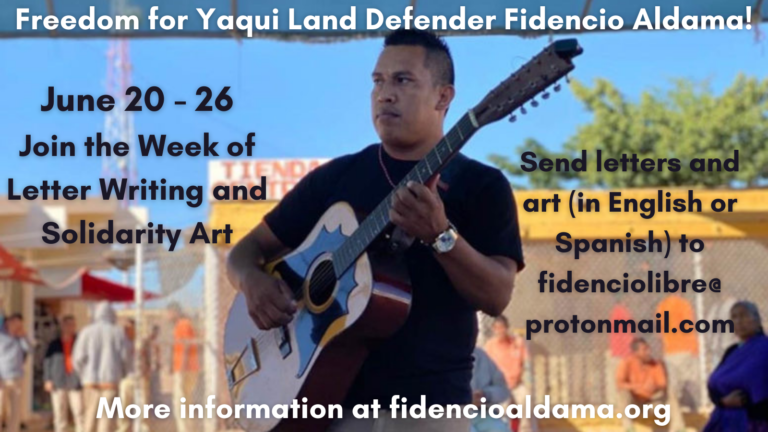December 29th, 2006 – Emily writes:
RETURN OF THE PRISONERS:
The lingering month’s anxiety slowly dissipated in San Juan Diego FNIC at dusk on Christmas Eve. As reunited families together returned to their homes for the first time since November 25, one could feel the tension that had burdened this humble community dissolve in the brisk air of the desert night. It was as if everyone—fathers, mothers, children, neighbors, friends and supporters—exhaled together, sighing in thankful relief to finish this painful chapter of an uncertain story clearly not yet over in Southern Mexico.
I unfortunately missed the precious moment when San Juan Diego’s political prisoners stepped off the bus and into the open air of their Huajuapan neighborhood. Instead myself and other CACTUS organizers had been rushing to finish preparing a fruit salad to feed 200 people for the evening’s Christmas celebration. However, when I finally did arrive, Betty Cariño of CACTUS whispered in my ear that the moment was both historical and emotional. The now liberated Huajuapeños, who just hours earlier were cursed with the horrors of confinement, were passionately greeted with joyful shouts and tears of yearning. Their heads were laden with welcoming confetti. And a never-ending round of hugs metaphorically reunited the San Juan Diego residents with their home, linking neighbors to place.
Following the reception, numerous social movement leaders offered words of hospitality, support and solidarity to the gathered community of San Juan Diego. Knowing that the former political prisoners surely wanted to be finally resting in comforts of their homes, the leaders comments were brief but nevertheless inspiring. Another round of informal greeting and embracing followed before the families eventually retreated to their houses. In the face of political repression, institutionalized fear and economic poverty, this gathering profoundly demonstrated the depth and strength of neighborly bonds and mutual aid that is present in San Juan Diego. And as the crowd began to disperse, the all-around mood was unmistakably one of appreciation for freedom, family and home.
PREPARING POZOLE
Our friends from CACTUS then took me to the Doña Emma’s home across the way from Bernadita’s to help prepare the pozole for the evening’s Posada. San Juan Diego is a squatter community; a neighborhood that physically reflects capitalism’s marginalized and forgotten populations. Houses are made from tin sheet metal. Sheets separate rooms, and floors are the earth of pachamama. Water must be carried from a nearby well, and food is cooked on open fires in the yards.
At Doña Emma’s, four women from the neighborhood gathered to cook the pozole: a chicken and corn like soup that is dressed with molle sauce, radishes, lettuce and lime. Together they collectively worked: cutting vegetables, boiling water, stirring corn, and keeping the fire alive. The activity was not that much unlike pre-planning that my comp’has from the north do before community events. The major difference, however, was the intruding and persistent affects of Ulises Ruíz’s political regime on what should flat-out have been a PARTY. While cutting radishes, I asked a fellow cook how this year was different from years past. She thoughtfully responded that they had this problem, where so many of their neighbors were imprisoned.
Shortly later, two of Bernadita’s daughters came over to see what I was doing. I asked them where was their mother. “She’s at home crying,” they answered. My heart stopped momentarily… mostly from the understanding that despite their freedom, coping with the trauma and affects of the Oaxacan political crisis was far from over for the residents of San Juan Diego FNIC.
LA POSADA
The Christmas Eve Posada had been planned for many days. In the face of repression and separation, CACTUS, Tennessee and I wanted San Juan Diego’s children to have the opportunity to celebrate the coming holidays. However, the freedom of their parents and siblings brought sweetness to the evening incomparable to the fruit of any tree.
The community gathered at around ten o’clock at Doña Emma’s. Prayers began shortly after, and a procession fell behind the youth that bore statues of the young Jesus to be returned to his manger. We moved in unison through the neighborhood, candlelight leading us to the small church where the service ended. I only wish that I knew more about the biblical significance of Jesus Christ’s birth (though I imagine that it is quite significant), because the evening was clearly charged with a spirit of metaphor and personification that my ignorance does not understand.
At this point, the cooks served a delicious pozole and fruit salad. The entire community was together, warmed by the presence of their missed neighbors.
I want to thank everyone who have supported this trip and helped make this evening happen. I also want to thank the many people from around the world sent letters of solidarity to the families of San Juan Diego. Your words are DEEPLY appreciated.
Tennessee and I will soon post the stories of these political prisoners. STAY TUNED.
—
source: http://vivamixteca.blogspot.com


